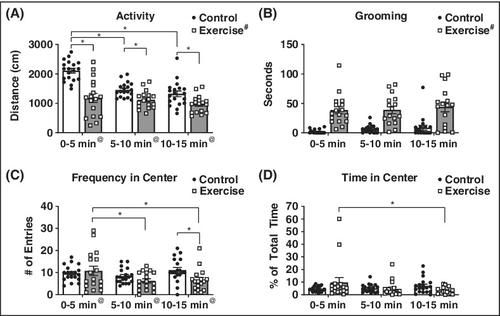当前位置:
X-MOL 学术
›
Genes Brain Behav.
›
论文详情
Our official English website, www.x-mol.net, welcomes your
feedback! (Note: you will need to create a separate account there.)
Acute forced exercise increases Bdnf IV mRNA and reduces exploratory behavior in C57BL/6J mice.
Genes, Brain and Behavior ( IF 2.4 ) Pub Date : 2019-10-16 , DOI: 10.1111/gbb.12617 Andrew C Venezia 1 , Molly M Hyer 2 , Erica R Glasper 2 , Stephen M Roth 3 , Elizabeth M Quinlan 4
Genes, Brain and Behavior ( IF 2.4 ) Pub Date : 2019-10-16 , DOI: 10.1111/gbb.12617 Andrew C Venezia 1 , Molly M Hyer 2 , Erica R Glasper 2 , Stephen M Roth 3 , Elizabeth M Quinlan 4
Affiliation

|
Acute exercise has been shown to improve memory in humans. Potential mechanisms include increased Bdnf expression, noradrenergic activity and modification of glutamate receptors. Because mice are commonly used to study exercise and brain plasticity, it is important to explore how acute exercise impacts behavior in this model. C57BL/6J mice were assigned to three groups: control, moderate‐intensity running, and high‐intensity running. Control mice were placed on a stationary treadmill for 30 minutes and moderate‐ and high‐intensity mice ran for 30 minutes at 12 and 15‐17 m/min, respectively. Mice were sacrificed immediately after running and the hippocampus removed. Total Bdnf , Bdnf exon IV, and glutamate receptor subunits were quantified with quantitative polymerase chain reaction. Total and phosphorylated GluR1 (Ser845 and Ser831) protein was quantified following immunoblotting. Utilizing the same protocol for control and high‐intensity running, object location memory was examined in a separate cohort of mice. Anxiety‐like behavior was assessed in the open field task (OFT) in a third cohort of mice that were separated into four groups: control‐saline, control‐DSP‐4, acute exercise‐saline, and acute exercise‐DSP‐4. DSP‐4 was used to lesion the central noradrenergic system. We observed higher Bdnf IV mRNA in high‐intensity runners compared to controls, but no effects of acute exercise on memory. In the OFT, runners traveled less distance and spent more time grooming than controls. DSP‐4 did not attenuate the effects of exercise. A single bout of exercise increases Bdnf IV mRNA in an intensity‐dependent manner; however, high‐intensity running reduces exploratory behavior in C57BL/6J mice.
中文翻译:

急性强迫运动增加 Bdnf IV mRNA 并减少 C57BL/6J 小鼠的探索行为。
急性运动已被证明可以改善人类的记忆力。潜在机制包括Bdnf表达增加、去甲肾上腺素活性和谷氨酸受体修饰。由于小鼠通常用于研究运动和大脑可塑性,因此探索急性运动如何影响该模型中的行为非常重要。C57BL/6J 小鼠被分为三组:对照组、中等强度跑步和高强度跑步。将对照小鼠放在静止的跑步机上 30 分钟,中等强度和高强度的小鼠分别以 12 和 15-17 m/min 的速度跑 30 分钟。小鼠在奔跑后立即处死,去除海马体。总Bdnf _ _外显子 IV 和谷氨酸受体亚基通过定量聚合酶链反应进行定量。免疫印迹后对总和磷酸化的 GluR1(Ser845 和 Ser831)蛋白进行定量。使用相同的控制和高强度跑步协议,在另一组小鼠中检查对象位置记忆。在第三组小鼠的野外任务 (OFT) 中评估焦虑样行为,这些小鼠分为四组:对照-盐水、对照-DSP-4、急性运动-盐水和急性运动-DSP-4。DSP-4 用于损伤中枢去甲肾上腺素能系统。我们观察到更高的Bdnf IV与对照组相比,高强度跑步者的 mRNA,但急性运动对记忆力没有影响。在 OFT 中,跑者比对照组跑得更少,花更多时间梳理毛发。DSP-4 没有减弱运动的影响。单次运动以强度依赖性方式增加Bdnf IV mRNA;然而,高强度跑步会降低 C57BL/6J 小鼠的探索行为。
更新日期:2019-10-16
中文翻译:

急性强迫运动增加 Bdnf IV mRNA 并减少 C57BL/6J 小鼠的探索行为。
急性运动已被证明可以改善人类的记忆力。潜在机制包括Bdnf表达增加、去甲肾上腺素活性和谷氨酸受体修饰。由于小鼠通常用于研究运动和大脑可塑性,因此探索急性运动如何影响该模型中的行为非常重要。C57BL/6J 小鼠被分为三组:对照组、中等强度跑步和高强度跑步。将对照小鼠放在静止的跑步机上 30 分钟,中等强度和高强度的小鼠分别以 12 和 15-17 m/min 的速度跑 30 分钟。小鼠在奔跑后立即处死,去除海马体。总Bdnf _ _外显子 IV 和谷氨酸受体亚基通过定量聚合酶链反应进行定量。免疫印迹后对总和磷酸化的 GluR1(Ser845 和 Ser831)蛋白进行定量。使用相同的控制和高强度跑步协议,在另一组小鼠中检查对象位置记忆。在第三组小鼠的野外任务 (OFT) 中评估焦虑样行为,这些小鼠分为四组:对照-盐水、对照-DSP-4、急性运动-盐水和急性运动-DSP-4。DSP-4 用于损伤中枢去甲肾上腺素能系统。我们观察到更高的Bdnf IV与对照组相比,高强度跑步者的 mRNA,但急性运动对记忆力没有影响。在 OFT 中,跑者比对照组跑得更少,花更多时间梳理毛发。DSP-4 没有减弱运动的影响。单次运动以强度依赖性方式增加Bdnf IV mRNA;然而,高强度跑步会降低 C57BL/6J 小鼠的探索行为。











































 京公网安备 11010802027423号
京公网安备 11010802027423号